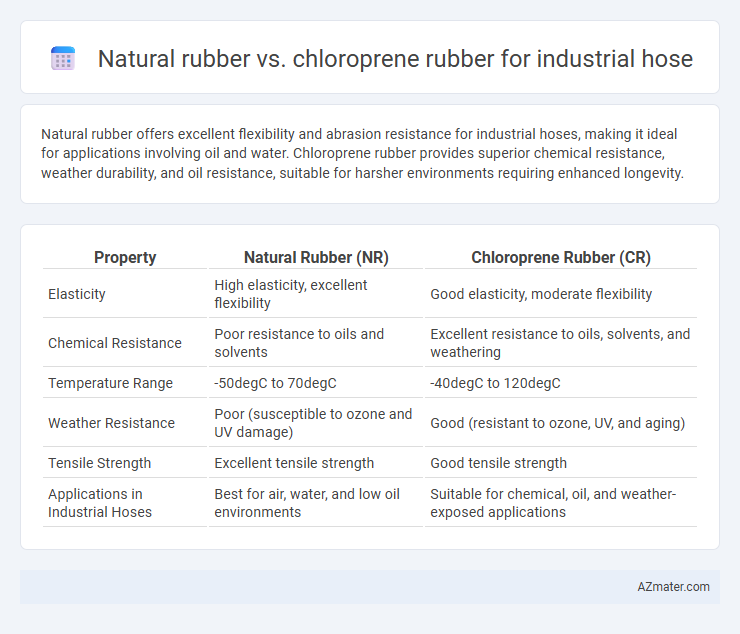Natural rubber offers excellent flexibility and abrasion resistance for industrial hoses, making it ideal for applications involving oil and water. Chloroprene rubber provides superior chemical resistance, weather durability, and oil resistance, suitable for harsher environments requiring enhanced longevity.
Table of Comparison
| Property | Natural Rubber (NR) | Chloroprene Rubber (CR) |
|---|---|---|
| Elasticity | High elasticity, excellent flexibility | Good elasticity, moderate flexibility |
| Chemical Resistance | Poor resistance to oils and solvents | Excellent resistance to oils, solvents, and weathering |
| Temperature Range | -50degC to 70degC | -40degC to 120degC |
| Weather Resistance | Poor (susceptible to ozone and UV damage) | Good (resistant to ozone, UV, and aging) |
| Tensile Strength | Excellent tensile strength | Good tensile strength |
| Applications in Industrial Hoses | Best for air, water, and low oil environments | Suitable for chemical, oil, and weather-exposed applications |
Introduction to Industrial Hose Materials
Natural rubber offers excellent flexibility and abrasion resistance, making it ideal for industrial hoses requiring durability under mechanical stress. Chloroprene rubber (neoprene) provides superior chemical resistance and weathering properties, which enhances hose performance in harsh environments with exposure to oils, solvents, and ozone. Selecting the appropriate material depends on application-specific factors such as temperature range, chemical exposure, and flexibility requirements for optimal hose longevity and safety.
Overview of Natural Rubber
Natural rubber is a highly elastic polymer derived from the latex of rubber trees, widely used in industrial hoses for its excellent tensile strength, flexibility, and resistance to abrasion. Its natural composition provides superior performance in dynamic applications, maintaining durability under repeated stress and varying temperatures. Compared to chloroprene rubber, natural rubber offers better resilience and tear resistance but is less resistant to oils, ozone, and chemicals.
Overview of Chloroprene Rubber (Neoprene)
Chloroprene rubber, commonly known as Neoprene, offers superior weather, ozone, and chemical resistance compared to natural rubber, making it ideal for industrial hose applications exposed to harsh environments. Its excellent elasticity and durability ensure reliable performance under varying temperatures and mechanical stresses. Neoprene's balanced properties provide enhanced resistance to oils, solvents, and abrasion, surpassing natural rubber in versatility and lifespan for demanding industrial uses.
Key Physical Properties Comparison
Natural rubber offers excellent tensile strength and abrasion resistance, making it suitable for high-flexibility industrial hoses, while chloroprene rubber (neoprene) excels in chemical resistance and weathering stability. Chloroprene maintains superior ozone and oil resistance, critical for industrial applications involving exposure to harsh chemicals and outdoor environments. Both materials provide good elasticity, but chloroprene's enhanced durability under temperature variations and chemical exposure makes it preferable for more demanding industrial hose applications.
Chemical Resistance: Natural vs Chloroprene Rubber
Chloroprene rubber exhibits superior chemical resistance compared to natural rubber, making it more suitable for industrial hoses exposed to oils, solvents, and various chemicals. Natural rubber tends to degrade when in contact with hydrocarbons and acids, limiting its use in chemically aggressive environments. Industrial hoses made with chloroprene rubber maintain flexibility and durability under harsh chemical exposure, ensuring longer service life and enhanced performance.
Durability and Weather Resistance
Natural rubber offers excellent abrasion resistance and flexibility, making it highly durable for industrial hose applications involving repeated bending and stress. Chloroprene rubber, also known as neoprene, provides superior weather resistance, maintaining elasticity and strength under exposure to ozone, UV rays, and various chemicals. Industrial hoses made from chloroprene rubber outperform natural rubber in harsh outdoor environments due to their enhanced resistance to aging and environmental degradation.
Temperature Tolerance and Performance
Natural rubber offers excellent flexibility and abrasion resistance but has a limited temperature tolerance, typically up to 70degC, making it less suitable for high-temperature industrial hose applications. Chloroprene rubber (Neoprene) withstands higher temperatures, generally up to 120degC, and provides better chemical resistance and weather durability, enhancing hose performance in demanding environments. Industrial hoses made from chloroprene rubber maintain structural integrity and flexibility under elevated temperatures, ensuring longer service life and reliable operation.
Cost Differences and Availability
Natural rubber offers cost advantages for industrial hoses due to its lower raw material price and widespread availability from major producers in Southeast Asia. Chloroprene rubber, though more expensive, provides greater chemical resistance and weather durability, but its supply chain is more limited and prices are impacted by specialized manufacturing processes. Industries must weigh natural rubber's affordability and abundance against chloroprene's performance benefits and higher procurement costs.
Common Applications in Industry
Natural rubber is widely used in industrial hoses for applications requiring excellent flexibility, abrasion resistance, and resilience, such as water suction, agricultural irrigation, and general-purpose air and water transfer. Chloroprene rubber (neoprene) hoses offer superior chemical resistance, weatherability, and oil resistance, making them ideal for applications in chemical processing, petroleum transfer, and hydraulic systems. Both materials are chosen based on the specific environmental conditions and media being conveyed to optimize hose performance and durability.
Choosing the Right Rubber for Your Hose Needs
Natural rubber offers excellent flexibility, abrasion resistance, and tensile strength, making it ideal for industrial hoses requiring durability and elasticity under dynamic conditions. Chloroprene rubber, or neoprene, provides superior chemical resistance, weather resistance, and moderate oil resistance, suited for hoses exposed to harsh chemicals and outdoor environments. Selecting the right rubber depends on specific operational demands including exposure to chemicals, temperature variations, and mechanical stress to ensure hose longevity and performance.

Infographic: Natural rubber vs Chloroprene rubber for Industrial hose
 azmater.com
azmater.com